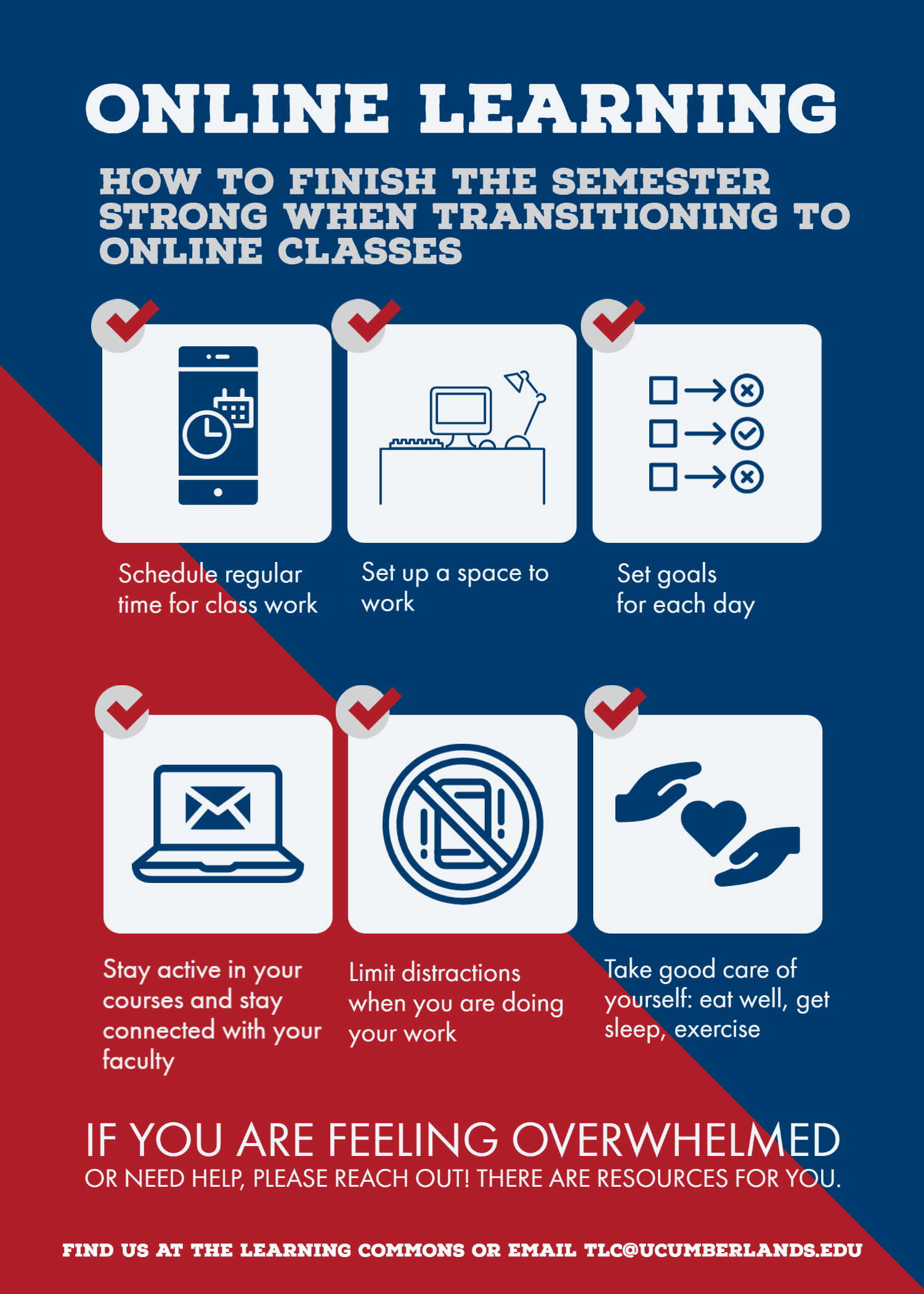These are some of the resources that I help provide to students at the University of the Cumberlands as Director of The Learning Commons
All across the globe, students are heading into the busiest time of the spring semester. Except, this is a semester unlike any other. After all, students are facing all the regular stresses (like assignments, papers, and looming exms), only they are now in addition to all of the unexpected challenges of 2020. Maybe you began your classes in-seat and now you are finishing them online. Maybe you were already an online student, but now you are forced to complete work at home with children around competing for space and internet. Maybe you lost your job, or maybe you are putting in more hours than ever as an essential worker. Whatever is happening in your life, all of the routines and traditions that give comfort and predictability to the semester are suddenly up in the air or completely cancelled.
With all of this uncertainty, many students will find themselves struggling. Indeed, even students who normally excel might find themselves having a hard time focusing. So what can you do? How can you persevere, push through this semester, and make the best of a situation that is far from ideal?
First, we all need to acknowledge that this is a very difficult and scary time. You aren’t just suddenly completing your coursework from home; you are sheltering in-place during a global crisis and trying to finish the semester at the same time. Now is a time when you will have to step up and take good care of yourself. Below are some suggestions for how students like you can cope with all of the uncertainty of Spring ’20:
• Talk about what is happening. Talking about all that is going on is an important way of making sense of the world and how it has changed. You can talk it through with a variety of different people: friends, family members, clergy, a mental health clinician, or even in a group discussion (Zoom, anyone?). Although it is harder to connect, it is more important now than ever.
• Get in a routine. Continue your usual schedule as much as possible. It may feel meaningless or uncomfortable because “normal” life may not feel so normal anymore, but try to go through your typical activities as well as you can.
• Sleep. Get plenty of rest. Bonus points if you go to sleep around the same time most days. You can have that Netflix binge on the weekends, no worries.
• Maintain Good Nutrition. Eat well-balanced and regular meals (even if you don’t feel like it).
• Stay Active. Mental or physical activity can be very healing: try taking a walk, exercising, writing in a journal, or reading. Whatever it is that gives you a little respite from worries and gives you a break from your work.
• Be gentle on yourself. Though common, your fears, anger, thoughts, and even the dreams you have at night may feel odd or unusual. Try not to criticize yourself for having them. Have faith that if you let yourself feel them, they will become less intense and painful with time. Feelings often point us in the direction of what is working for us and what needs to change.
• Don’t Numb Yourself. Be aware of numbing the pain with anything that is unhelpful, whether staying up late scrolling endlessly on your phone or using alcohol. If you find yourself retreating in unhealthy habits, find someone to talk to about what is happening. Remember that your campus resource centers are still out there. So are your parents and clergy.
In situations like these, self-care should take first priority. But when these tools are set in place, you still have coursework to complete. Our brains thrive on routine and predictability, and we can help train them to focus if we set up the right conditions. If you want to set yourself up for success, you might want to start by setting a schedule. Sure, it can be hard to know exactly when you will be able to do classwork if you are also homeschooling small children, or if the internet goes out. But you can certainly try for predictable study times and do your best to make it happen. It helps if you have a dedicated space—no matter how small or modest—to keep your schoolwork. Just going to that spot will help your brain get into study mode. Spend the first five to ten minutes reviewing what you need to get done and what assignments are due. Try to set about 3 goals for yourself every day to help you focus on what is important and make sure you are making headway. Part of your goals should be to stay active and connected in your classes, whether e-mailing a professor, posting on a discussion board, or attending a synchronous session. These connections will really help you stay involved and up-to-speed. Finally, try to avoid distractions. Even 20 minutes with “Do Not Disturb” on your phone can lead to surprising productivity.
Again, these are just some tools and tips to make the best of completing finals at a time when the world can feel upside down. Right now, students like yourself are developing skills that can help you anytime you encounter stress or difficulty in the future. While we cannot control our circumstances, we can control our reactions. Try to take a big step back and imagine the narrative you want for yourself – what role do you want to play in this story? How will it shape your life? Whether or not feel like you are accomplishing a lot right now, please know that by staying healthy at home, you are performing a patriotic duty. You are just what our nation needs right now, and developing all the important skills to take us into the future.
A planner like this one may be helpful for you as you take on your assignments. If you provide us your e-mail in the form below, we will send you a free printable copy.
Sky Marietta, PhD is the Director of The Learning Commons at the University of the Cumberlands. This blog is about her family’s adventures in the Kentucky Mountains, including their Williamsburg home.













